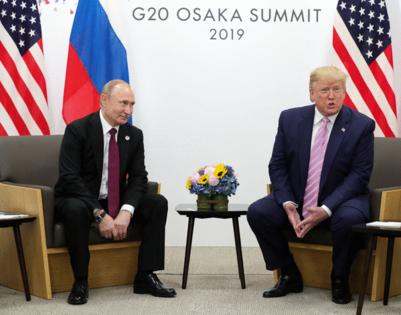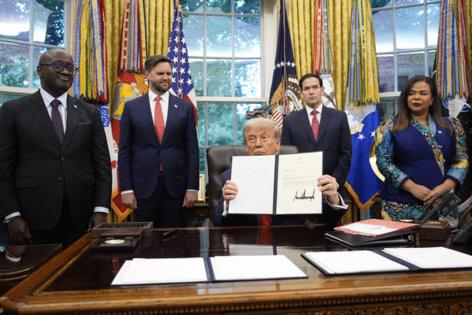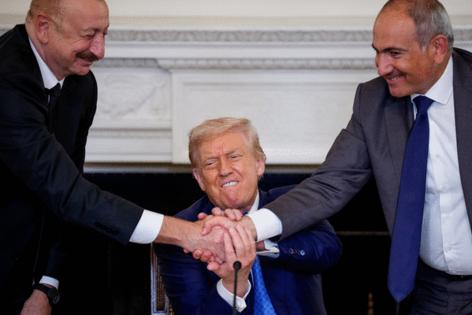Trump, casting himself as 'peacemaker-in-chief,' faces tests in Gaza and Ukraine
Published in Political News
WASHINGTON — After styling himself for decades as a dealmaker, President Donald Trump is showing some receipts in his second term of ceasefires and peace agreements brokered on his watch. But the president faces extraordinary challenges in his latest push to negotiate ends to the world's two bloodiest conflicts.
Stakes could not be higher in Ukraine, where nearly a million Russian soldiers have been killed or wounded in pursuit of Vladimir Putin's war of conquest, according to independent analysts. Hundreds of thousands of Ukrainian soldiers add to the catastrophic casualty toll. Trump's struggle to get both sides to a negotiating table, let alone to secure a ceasefire, has grown into a fixation for Trump, prompting rare rebukes of Putin from the U.S. president.
And in the Gaza Strip, an alliance that has withstood scathing international criticism over Israel's conduct of its war against Hamas has begun to show strain. Trump still supports the fundamental mission of Israel's prime minister, Benjamin Netanyahu, to destroy the militant group and secure the release of Israeli hostages in its possession. But mounting evidence of mass starvation in Gaza has begun to fray the relationship, reportedly resulting in a shouting match in their most recent call.
Breakthroughs in the two conflicts have evaded Trump, despite his efforts to fashion himself into the "peacemaker-in-chief" and floating his own nomination for the Nobel Peace Prize.
In Turnberry, Scotland, last month, Trump claimed that six wars had been stopped or thwarted under his watch since he returned to office in January. "I'm averaging about a war a month," he said at the time.
He has, in fact, secured a string of tangible successes on the international stage, overseeing a peace agreement between the Democratic Republic of the Congo and Rwanda; hosting a peace ceremony between Armenia and Azerbeijan; brokering a ceasefire between Cambodia and Thailand, and imposing an end to a 12-day war between Israel and Iran after engaging U.S. forces directly in the conflict.
"As president, my highest aspiration is to bring peace and stability to the world," Trump said at the ceremony with Armenian and Azerbaijani leaders Friday.
"We've only been here for six months. The world was on fire. We took care of just about every fire — and we're working on another one," he said, "with Russia, Ukraine."
Trump also takes credit for lowering tensions between Serbia and Kosovo, and for brokering a ceasefire between two nuclear states, India and Pakistan, a claim the latter supports but the former denies.
"Wars usually last five to 10 years," said Michael E. O'Hanlon, chair in defense and strategy at the Brookings Institution. "Trump is tactically clever, but no magician. If he actually gets three of these five conflicts to end, that's an incredible track record.
"In each case, he may exaggerate his own role," O'Hanlon said, but "that's OK — I welcome the effort and contribution, even if others deserve credit, too."
One-on-one with Putin
Well past his campaign promise of ending Russia's war with Ukraine "within 24 hours" of taking office, Trump has tried pressuring both sides to come to the negotiating table, starting with the Ukrainians. "You don't have the cards," Trump told Ukrainian President Volodymyr Zelenskyy in an infamous Oval Office meeting in February, chastising him to prepare to make painful concessions to end the war.
But in June, at a NATO summit in the Netherlands, Trump's yearslong geniality with Putin underwent a shift. He began criticizing Russia's leader as responsible for the ongoing conflict, accusing Putin of throwing "meaningless ... bull—" at him and his team.
"I'm not happy with Putin, I can tell you that much right now," Trump said, approving new weapons for Ukraine, a remarkable policy shift long advocated by the Europeans.
The Trump administration set Friday as a deadline for Putin to demonstrate his commitment to a ceasefire, or otherwise face a new round of crushing secondary sanctions — financial tools that would punish Russia's trading partners for continuing business with Moscow.
Those plans were put on hold after Trump announced he would meet with Putin in Alaska next week, a high-stakes meeting that will exclude Zelenskyy.
"The highly anticipated meeting between myself, as President of the United States of America, and President Vladimir Putin, of Russia, will take place next Friday, August 15, 2025, in the Great State of Alaska. Further details to follow," Trump wrote on his social media platform, Truth Social, on Friday. "Thank you for your attention to this matter!"
Meeting Putin one-on-one — the first meeting between a U.S. and Russian president in four years, and the first between Putin and any Western leader since he launched a full-scale invasion of Ukraine in 2022 — in and of itself could be seen as a reward for a Russian leader seeking to regain international legitimacy, experts said.
Worse still, Putin, a former KGB officer, could approach the meeting as an opportunity to manipulate the American president.
"Putin has refused to abandon his ultimate objectives in Ukraine — he is determined to supplant the Zelenskyy government in Kyiv with a pro-Russian regime," said Kyle Balzer, a scholar at the conservative American Enterprise Institute. "He wants ironclad guarantees that Ukraine will never gain admittance to NATO. So there is currently no agreement to be had with Russia, except agreeing to surrender to Putin's demands. Neither Ukraine nor Europe are interested in doing so.
"Put simply, Putin likely believes that he can wear down the current administration," Balzer added. "Threatening Russia with punitive acts like sanctions, and then pulling back when the time comes to do so, has only emboldened Putin to strive for ultimate victory in Ukraine."
A European official told The Times that, while the U.S. government had pushed for Zelenskyy to join the initial meeting, a response from Kyiv — noting that any territorial concession to Russia in negotiations would have to be approved in a ballot referendum by the Ukrainian people — scuttled the initial plan.
The Trump administration is prepared to endorse the bulk of Russia's occupation of Ukrainian territory, including the eastern region of Donbas and the Crimean peninsula, at the upcoming summit, Bloomberg reported. On Friday, Trump called the issue of territory "complicated."
"We're gonna get some back," he said. "There will be some swapping of territories."
Michael Williams, an international relations professor at Syracuse University, said that Trump has advocated for a ceasefire in Ukraine "at the expense of other strategic priorities such as stability in Europe and punishment of Russia through increased aid to Ukraine."
Such an approach, Williams said, "would perhaps force the Kremlin to end the war, and further afield, would signal to other potential aggressors, such as China, that violations of international law will be met with a painful response."
Gaza
At Friday's peace ceremony, Trump told reporters he was considering a proposal to relocate Palestinian refugees to Somalia and its breakaway region, Somaliland, once Israel ends hostilities against Hamas in the Gaza Strip.
"We are working on that right now," Trump said.
It was just the latest instance of Trump floating the resettlement of Palestinians displaced during the two-year war there, which has destroyed more than 90% of the structures throughout the strip and essentially displaced its entire population of 2 million people. The Hamas-run Health Ministry reports that more than 60,000 civilians and militants have died in the conflict.
Hamas, recognized as a terrorist organization by the United States, the European Union and others, has refused to concede the war, stating it would disarm only once a Palestinian state is established. The group continues to hold roughly 50 Israeli hostages, some dead and some alive, among 251 taken during its attack on Israel on Oct. 7, 2023, which also killed about 1,200 people.
Israel's Cabinet voted this week to approve a plan to take over Gaza City in the north of the strip and, eventually, the rest of the territory, a deeply unpopular strategy in the Israeli military and among the Israeli public. Netanyahu on Friday rejected the notion that Israel planned to permanently occupy Gaza.
Despite applying private pressure on Netanyahu, Trump's strategy has largely fallen in line with that of his predecessor, Joe Biden, whose team supported Israel's right to defend itself while working toward a peace deal that, at its core, would exchange the remaining hostages for a cessation of hostilities.
The talks have stalled, one U.S. official said, primarily blaming Hamas over its demands.
"In Gaza, there is a fundamental structural imbalance of dealing with a terrorist organization that may be immune to traditional forms of pressure — military, economic or otherwise — and that may even have a warped, perverse set of priorities in which the suffering of its own people is viewed as a political asset because it tarnishes the reputation of the other party, Israel," said Robert Satloff, executive director of the Washington Institute for Near East Policy. "So Trump really only has leverage over one party — his ally, Israel — which he has been reluctant to wield, reasonably so."
In Ukraine, too, Trump holds leverage he has been unwilling, thus far, to bring to bear.
"There, Trump has leverage over both parties but appears reluctant to wield it on one of them — Russia," Satloff said.
But Trump suggested Friday that threatened sanctions on India over its purchase of Russian oil, and his agreement with the North Atlantic Treaty Organization to secure greater security spending from European members, "had an impact" on Moscow's negotiating position.
"I think my instinct really tells me that we have a shot at it," Trump said. "I think we're getting very close."
©2025 Los Angeles Times. Visit latimes.com. Distributed by Tribune Content Agency, LLC.
































































Comments